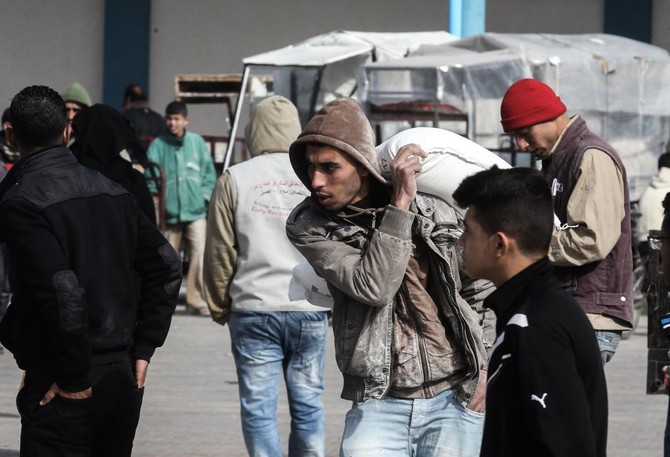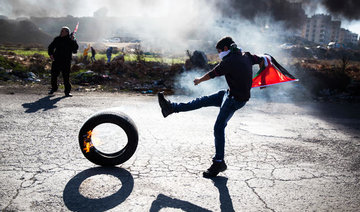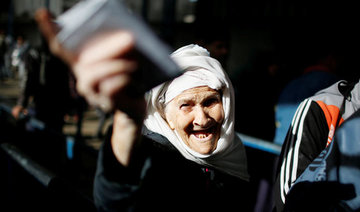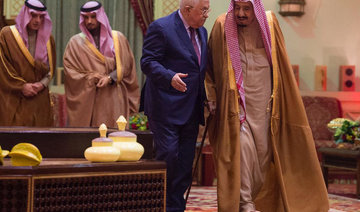LONDON: The Arab League and aid agencies on Wednesday warned of the devastating consequences of a US decision to freeze $65 million of Palestinian refugee funding.
The outcry came as the Palestinian president Mahmoud Abbas again blasted Donald Trump’s “sinful” decision to recognise Jerusalem as Israel’s capital.
Washington said on Tuesday it would provide $60 million to the UN Relief and Welfare Agency but would hold back a further $65 million. The US State Department said UNRWA needed to make unspecified reforms.
Both the head of the Arab League and the chief of the UN agency warned that holding back the money would exacerbate hardship, and effect education and health for some of the region’s most vulnerable people.
More than half a million boys and girls in 700 UNRWA schools could be affected by the fund cut, as well as Palestinian access to primary health care.
The cut in funding will effect Gaza in particular, where UNRWA helps much of its population of 2 million.
UNRWA’s Commissioner-General Pierre Krähenbühl said he would appeal to other donor nations for money and launch "a global fundraising campaign" aimed at keeping the agency's schools and clinics for refugees open through 2018 and beyond.
"At stake is the dignity and human security of millions of Palestine refugees, in need of emergency food assistance and other support in Jordan, Lebanon, Syria, and the West Bank and Gaza Strip," Krähenbühl said.
He also warned that the move risks further instability in the region by contributing to the conditions that feed extremist ideologies.
In a Twitter post earlier this month, Trump said that Washington gives the Palestinians "HUNDRED OF MILLIONS OF DOLLARS a year and get no appreciation or respect.”
Trump added that "with the Palestinians no longer willing to talk peace, why should we make any of these massive future payments to them?"
The US State Department said Washington had been UNRWA’s single largest donor for decades and insisted the decision to freeze the funding was taken to encourage other countries to help pay for and reform the agency.
Some US official had wanted to cut all aid to Palestinians while others were concerned about the humanitarian and diplomatic fallout.
Arab League chief Ahmed Aboul Gheit said halting the money was aimed at wiping out the whole Palestinian refugee issue.
"This decision affects the education and health of Palestinians and aims to eradicate the question of refugees," he said.
Hanan Ashrawi, a senior official in the Palestine Liberation Organization said the White House was "targeting the most vulnerable segment of the Palestinian people".
Israeli Prime Minister Benjamin Netanyahu, who has called for a gradual cut in UNRWA funding and transferring its responsibilities to the UN global refugee agency, said he supported the move.
The freeze comes aid outrage among Palestinians over Trump’s decisions to recognise Jerusalem as Israel’s capital. Palestinians want the city to be the capital of their future state and east Jerusalem has been illegally occupied by Israel since 1967.
"Jerusalem will be a gate for peace only if it is Palestine's capital, and it will be a gate of war, fear and the absence of security and stability, God forbid, if it is not," a furious Mahmoud Abbas said at a conference in Cairo on Wednesday.
The Palestinian president, who initially described the decision as a "slap of the century," said the US has disqualified itself from continuing as a broker in any Israeli-Palestinian negotiations.
Netanyahu threw fuel on the fire on Wednesday by saying he was certain the US Embassy in Israel would be moved to Jerusalem sometime this year.
Moving the embassy was a key Trump foreign policy election pledge but US officials have said it is unlikely it would move from Tel Aviv before the end of the end his term in office.
The Cairo conference was organized by Al-Azhar, the primary seat of learning for the world's Sunni Muslims.
Earlier, Al-Azhar's grand imam and Egypt's top Muslim cleric, Sheikh Ahmed Al-Tayeb, described Trump's Jerusalem decision as “unjust”. He said it must be countered by a revival of awareness of the Palestinian question.
— With AP, AFP and Reuters
Warnings over ‘devastating’ US decision to freeze Palestinian refugee funding
Warnings over ‘devastating’ US decision to freeze Palestinian refugee funding

Nine killed in Iran as bus, fuel truck collide — state media

- Iran has a poor road safety record, with over 20,000 deaths recorded between March 2023 and March 2024
- In August, 28 Pakistani Muslim pilgrims en route to Iraq were killed when their bus crashed in central Iran
TEHRAN: At least nine people were killed on Monday when a bus collided with a fuel truck in Iran’s southeast, state media reported, the second mass casualty road accident within days.
Mohammad Mehdi Sajjadi, head of the Red Crescent Society in Sistan-Baluchestan province, told the official IRNA news agency that “nine people lost their lives and 13 others were injured in the accident in which a bus collided with a fuel truck near Zahedan.”
On Saturday, 10 people were killed when a bus plunged into a ravine in Iran’s western Lorestan province.
Iran has a poor road safety record, with more than 20,000 deaths in accidents recorded between March 2023 and March 2024, according to figures from the judiciary’s Forensic Medicine Organization cited by local media.
In August, 28 Pakistani Muslim pilgrims en route to Iraq were killed when their bus crashed in central Iran.
Impoverished Sistan-Baluchestan, which borders Pakistan and Afghanistan, saw one of Iran’s deadliest accidents in 2004, when a gasoline tanker collided with a bus, sparking a massive fire that killed more than 70 people.
Gaza official says Israel strikes on hospital ‘terrifying’

- The area has been the focus of an intense air and ground campaign by Israeli forces since October 6, aimed at prevent Hamas from regrouping
Gaza Strip: An official from one of only two functioning hospitals in northern Gaza told AFP on Monday that Israeli forces were continuing to target his facility and urged the international community to intervene before “it is too late.”
Hossam Abu Safiyeh, director of Kamal Adwan hospital in the city of Beit Lahia, described the situation at the medical facility as “extremely dangerous and terrifying” owing to shelling by Israeli forces.
An Israeli military spokesman denied that the hospital was being targeted.
“I am unaware of any strikes on Kamal Adwan hospital,” he told AFP.
Safiyeh reported that the hospital, which is currently treating 91 patients, had been targeted on Monday by Israeli drones.
“This morning, drones dropped bombs in the hospital’s courtyards and on its roof,” said Safiyeh in a statement.
“The shelling, which also destroyed nearby houses and buildings, did not stop throughout the night.”
The shelling and bombardment have caused extensive damage to the hospital, Safiyeh added.
“Bullets hit the intensive care unit, the maternity ward, and the specialized surgery department causing fear among patients,” he said, adding that a generator was also targeted.
“The world must understand that our hospital is being targeted with the intent to kill and forcibly displace the people inside.
“We face a constant threat every day. The shelling continues from all directions... The situation is extremely critical and requires urgent international intervention before it is too late,” he said.
On Sunday, Safiyeh said he received orders to evacuate the hospital, but the military denied issuing such directives.
Located in Beit Lahia, the hospital is one of only two still operational in northern Gaza.
The area has been the focus of an intense air and ground campaign by Israeli forces since October 6, aimed at prevent Hamas from regrouping.
Most of the dead and injured from the offensive are brought to Kamal Adwan and Al-Awda hospitals.
The United Nations and other organizations have repeatedly decried the worsening humanitarian conditions in Gaza, particularly in the north, since the latest military offensive began.
Rights groups have consistently appealed for hospitals to be protected and for the urgent delivery of medical aid and fuel to keep the facilities running.
Israeli officials have accused Hamas militants of using the hospitals as command and control centers to plan attacks against the military.
The war in Gaza broke out on October 7 last year after Hamas militants launched an attack on southern Israel that resulted in the deaths of 1,208 people on the Israeli side, most of them civilians, according to an AFP tally based on official Israeli figures.
Israel’s retaliatory military offensive in Gaza has killed at least 45,259 people, a majority of them civilians, according to the Hamas-run territory’s health ministry, figures the UN says are reliable.
Some gaps have narrowed in elusive Gaza ceasefire deal, sides say

- Palestinian official familiar with the talks said some sticking points had been resolved
- But identity of some of Palestinian prisoners to be released by Israel in return for hostages yet to be agreed
CAIRO/JERUSALEM: Gaps between Israel and Hamas over a possible Gaza ceasefire have narrowed, according to Israeli and Palestinian officials’ remarks on Monday, though crucial differences have yet to be resolved.
A fresh bid by mediators Egypt, Qatar and the United States to end the fighting and release Israeli and foreign hostages has gained momentum this month, though no breakthrough has yet been reported.
A Palestinian official familiar with the talks said while some sticking points had been resolved, the identity of some of the Palestinian prisoners to be released by Israel in return for hostages had yet to be agreed, along with the precise deployment of Israeli troops in Gaza.
His remarks corresponded with comments by the Israeli diaspora minister, Amichai Chikli, who said both issues were still being negotiated. Nonetheless, he said, the sides were far closer to reaching agreement than they have been for months.
“This ceasefire can last six months or it can last 10 years, it depends on the dynamics that will form on the ground,” Chikli told Israel’s Kan radio. Much hinged on what powers would be running and rehabilitating Gaza once fighting stopped, he said.
The duration of the ceasefire has been a fundamental sticking point throughout several rounds of failed negotiations. Hamas wants an end to the war, while Israel wants an end to Hamas’ rule of Gaza first.
“The issue of ending the war completely hasn’t yet been resolved,” said the Palestinian official.
Israeli minister Zeev Elkin, a member of Prime Minister Benjamin Netanyahu’s security cabinet, told Israel’s Army Radio that the aim was to find an agreed framework that would resolve that difference during a second stage of the ceasefire deal.
Chikli said the first stage would be a humanitarian phase that will last 42 days and include a hostage release.
HOSPITAL
The war was triggered by Hamas’ Oct. 7, 2023 attack on southern Israel, in which 1,200 people were killed and 251 taken hostage to Gaza, according to Israeli tallies.
Israel’s campaign against Hamas in Gaza has since killed more than 45,200 Palestinians, according to health officials in the Hamas-run enclave. Most of the population of 2.3 million has been displaced and much of Gaza is in ruins.
At least 11 Palestinians were killed in Israeli strikes on Monday, medics said.
One of Gaza’s few still partially functioning hospitals, on its northern edge, an area under intense Israeli military pressure for nearly three months, sought urgent help after being hit by Israeli fire.
“We are facing a continuous daily threat,” said Hussam Abu Safiya, director of the Kamal Adwan Hospital. “The bombing continues from all directions, affecting the building, the departments, and the staff.”
The Israeli military did not immediately comment. On Sunday it said it was supplying fuel and food to the hospital and helping evacuate some patients and staff to safer areas.
Palestinians accuse Israel of seeking to permanently depopulate northern Gaza to create a buffer zone, which Israel denies.
Israel says its operation around the three communities on the northern edge of the Gaza Strip — Beit Lahiya, Beit Hanoun and Jabalia — is targeting Hamas militants.
On Monday, the United Nations’ aid chief, Tom Fletcher, said Israeli forces had hampered efforts to deliver much needed aid in northern Gaza.
“North Gaza has been under a near-total siege for more than two months, raising the specter of famine,” he said. “South Gaza is extremely overcrowded, creating horrific living conditions and even greater humanitarian needs as winter sets in.”
Palestinians in Jenin observe a general strike

- The Palestinian Authority exercises limited authority in population centers in the West Bank
JENIN: Palestinians in the volatile northern West Bank town of Jenin are observing a general strike called by militant groups to protest a rare crackdown by Palestinian security forces.
An Associated Press reporter in Jenin heard gunfire and explosions, apparently from clashes between militants and Palestinian security forces. It was not immediately clear if anyone was killed or wounded. There was no sign of Israeli troops in the area.
Shops were closed in the city on Monday, the day after militants killed a member of the Palestinian security forces and wounded two others.
Militant groups called for a general strike across the territory, accusing the security forces of trying to disarm them in support of Israel’s half-century occupation of the territory.
The Western-backed Palestinian Authority is internationally recognized but deeply unpopular among Palestinians, in part because it cooperates with Israel on security matters. Israel accuses the authority of incitement and of failing to act against armed groups.
The Palestinian Authority blamed Sunday’s attack on “outlaws.” It says it is committed to maintaining law and order but will not police the occupation.
The Palestinian Authority exercises limited authority in population centers in the West Bank. Israel captured the territory in the 1967 Mideast War, and the Palestinians want it to form the main part of their future state.
Israel’s current government is opposed to Palestinian statehood and says it will maintain open-ended security control over the territory. Violence has soared in the West Bank following Hamas’ Oct. 7, 2023 attack out of Gaza, which ignited the war there.
Qatari minister arrives in Damascus on first Qatar Airways flight since Assad’s fall

DUBAI: Qatar’s minister of state for foreign affairs arrived in Damascus on Monday on the first Qatar Airways flight to the Syrian capital since the fall of President Bashar Assad two weeks ago, Doha’s foreign ministry said.
Qatar’s foreign ministry spokesperson said Mohammed Al-Khulaifi was the most senior official of the Gulf Arab state to visit Syria since militants toppled the Assad family’s 54-year-long rule.

















